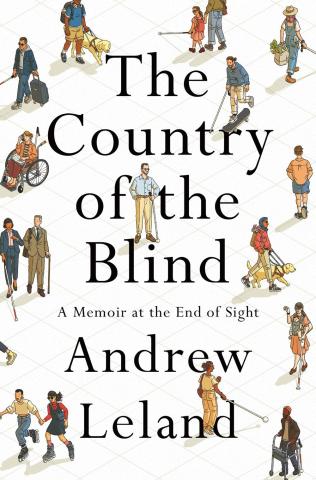
Memorable Memoirs of Differently-Abled Experiences
by Cathy Cooney
When you visit the library this month, we hope you’ll stop by our book displays in the youth and adult areas featuring Disability Awareness Month. You’ll find books by, about, and for people who are deaf or hard of hearing or who have developmental, intellectual, mental, physical, or vision impairments. (Pro tip: Some of the featured books are perfect for the 12 to Try reading challenge category of memoirs by someone with neurodiversity or ability diversity. Find out more at amespubliclibrary.org/12totry.) Here are just a few of my recommendations!
“The Country of the Blind” by Andrew Leland explores blind culture, including philosophy, history, literature, and interviews with people experiencing blindness. Diagnosed with retinitis pigmentosa, the author himself explores the transition into blindness as he gradually loses his vision. In Eddie Ndopu’s “Sipping Dom Pérignon Through a Straw,” the author shares his life as a student at Oxford University, and the challenges that come with a prestigious education and being disabled (spinal muscular atrophy), gay, and Black.
In “Year of the Tiger” by Alice Wong, the author uses mixed-media to create a variety of unique short pieces (including fiction and illustrations), telling her life story. Born with muscular dystrophy, she never wanted to be an activist, but one thing after another made it clear that she needed to be one. “Being Heumann” by Judith Heumann with Kristen Joiner, tells of Heumann’s lifetime of advocacy against discrimination. Paralyzed as an infant, she fought to go to school, to sit in non-special education classes, and to earn her teacher’s license, which she was initially denied due to her disability.
“Heart Berries” by Terese Marie Mailhot explores the author’s experience with bipolar disorder, her Indigenous identity, and how these elements impacted her life, from teenage marriage to a stay in a psychiatric hospital to her challenging familial ties. Esmé Weijun Wang uses autobiographical essays to explore her experience with mental illness in “The Collected Schizophrenias.” For a more personal take on the subjectivity of standards of beauty, pick up “Easy Beauty” by Chloé Cooper Jones, who was born with a congenital condition affecting her spine and hips. Or there’s Nyle DiMarco’s “Deaf Utopia,” which chronicles the author’s experiences on reality TV, in modeling, learning about his LGBTQIA+ identity, and telling his story in written English transcribed from ASL.
I hope you’ll take a moment to pick up one of these incredible life stories—or one of the many others on the library’s physical and digital shelves.